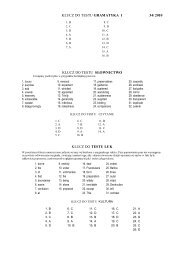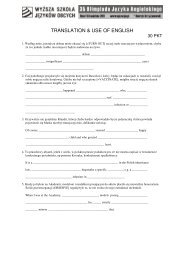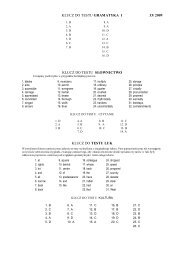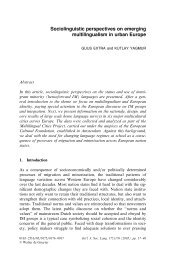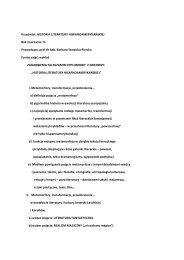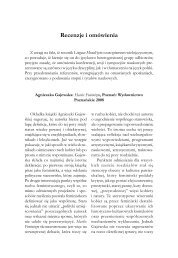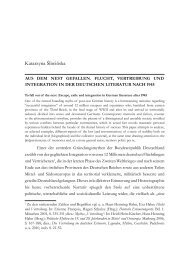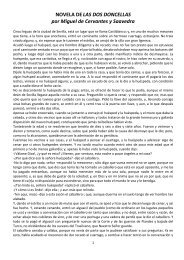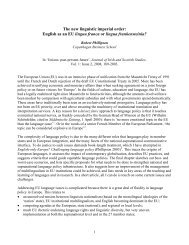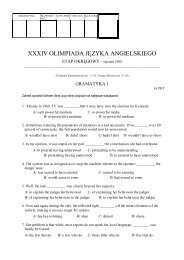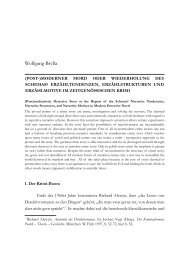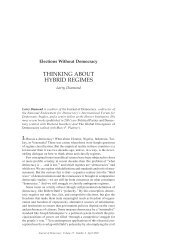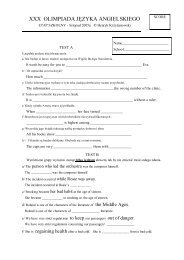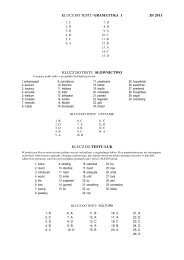African American women and feminism: Alice Walker's womanism ...
African American women and feminism: Alice Walker's womanism ...
African American women and feminism: Alice Walker's womanism ...
Create successful ePaper yourself
Turn your PDF publications into a flip-book with our unique Google optimized e-Paper software.
10 Marta Mazurek<br />
ary production mastery of the Bible <strong>and</strong> the poetry of Milton, Pope <strong>and</strong> Gray was<br />
contrary to the eighteenth-century conviction that Black slaves were naturally unable<br />
to create literature, which proved their sub-human position in the chain of beings<br />
<strong>and</strong> justified the institution of slavery in America. Two hundred <strong>and</strong> twenty years<br />
after the first <strong>African</strong> <strong>American</strong> woman proved her humanity by writing poetry, the<br />
first <strong>African</strong> <strong>American</strong> woman Toni Morrison received the Nobel Prize in Literature<br />
for the outst<strong>and</strong>ing value of her creative writing. Morrison’s novels are not art for<br />
art’s sake, as she claims, but they are tightly linked to the culture <strong>and</strong> history of her<br />
community. “I write [...] village literature, fiction that is really for the village, for the<br />
tribe”, she asserts, adding that her novels “should clarify the roles that have become<br />
obscured; they ought to identify those things in the past that are useful <strong>and</strong> those<br />
things that are not; <strong>and</strong> they ought to give nourishment” . In order to write literature<br />
deeply rooted in the <strong>African</strong> <strong>American</strong> culture of her community, she incorporates<br />
the major characteristics of Black art, that is oral quality, a choral note, myth, music,<br />
folklore <strong>and</strong>, most importantly, the trope of the ancestor <strong>and</strong> memory .<br />
As many other <strong>African</strong> <strong>American</strong> <strong>women</strong> writers, Morrison asserts that she<br />
situates herself within the <strong>African</strong> <strong>American</strong> community <strong>and</strong> its tradition of resisting<br />
discrediting views of the dominant society rather that aligns herself with<br />
the Black feminist model of critical inquiry, “because any model of criticism that<br />
excludes males from it is as hampered as any model of criticism of Black literature<br />
that excludes <strong>women</strong> from it” . Morrison’s assertion implies that for an <strong>African</strong><br />
<strong>American</strong> woman writer it is more important to create for the nourishment of<br />
the <strong>African</strong> <strong>American</strong> community including both men <strong>and</strong> <strong>women</strong> than separate<br />
herself from it by assuming a Black feminist stance. Discernible in the essay<br />
Rootedness: The Ancestor as Foundation is her choice to remain loyal to the politics<br />
of Black nationalism/ethnicity <strong>and</strong> the rejection of Black <strong>feminism</strong> as separating<br />
<strong>African</strong> <strong>American</strong> <strong>women</strong> from men. Moreover, Afrocentric values that permeate<br />
the <strong>African</strong> <strong>American</strong> family, community, religion <strong>and</strong> culture point to a value<br />
system that existed before <strong>and</strong> independently of the system of racial domination,<br />
<strong>and</strong> reliance on Afrocentric tradition, that is precisely on what differentiates the<br />
<strong>African</strong> <strong>American</strong> community from other communities, seems to be particularly<br />
empowering for Morrison, as it is for her characters.<br />
<strong>African</strong> <strong>American</strong> <strong>women</strong>’s anxiety caused by their necessity to choose loyalties,<br />
as Morrison did in her essay, stems from an apparent conflict between feminist<br />
critical framework <strong>and</strong> <strong>African</strong> <strong>American</strong> unity. On the basis of a selection of<br />
<br />
T. LeClair: The Language Must Not Sweat: A Conversation with Toni Morrison. “New Republic” 1981,<br />
184, p. 26.<br />
<br />
T. Morrison: Rootedness: The Ancestor as Foundation. In: What Moves at the Margin. Ed. C. C. Denard.<br />
Jackson: University Press of Mississippi, 2008, p. 61.<br />
<br />
T. Morrison: Rootedness: The Ancestor as Foundation, op.cit., p. 64.



